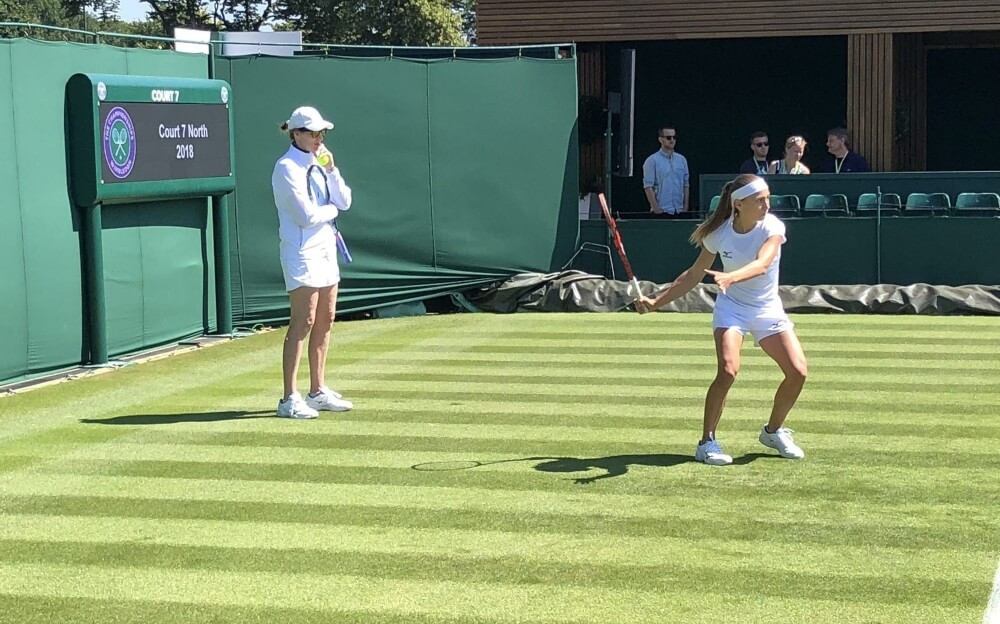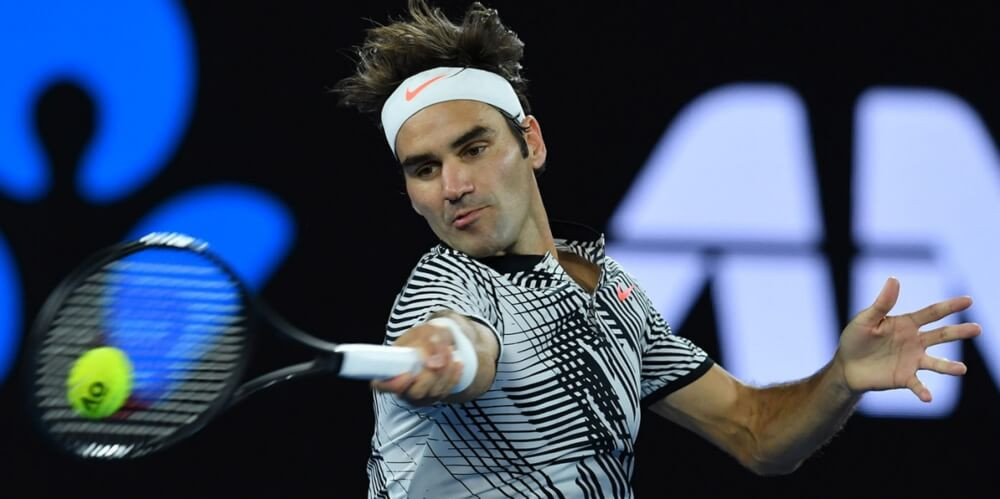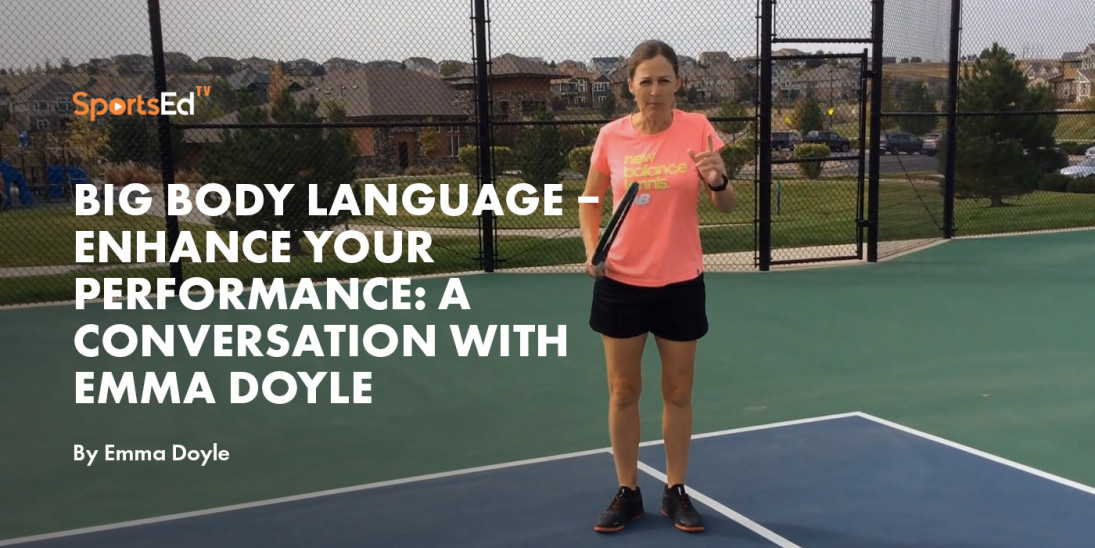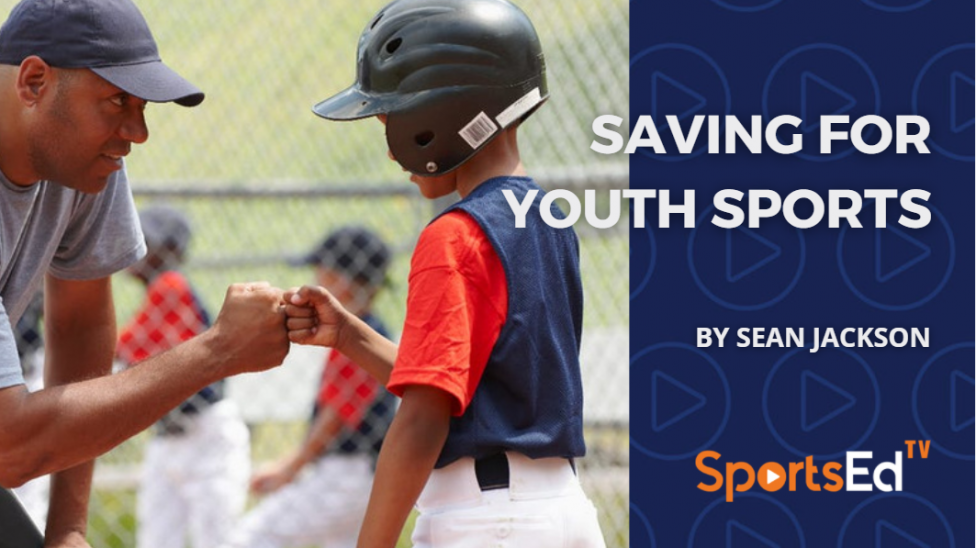Tennis
Welcome and thanks for visiting...

Tennis Career of WTA Player Sarah Stone - a Conversation With Sarah Stone
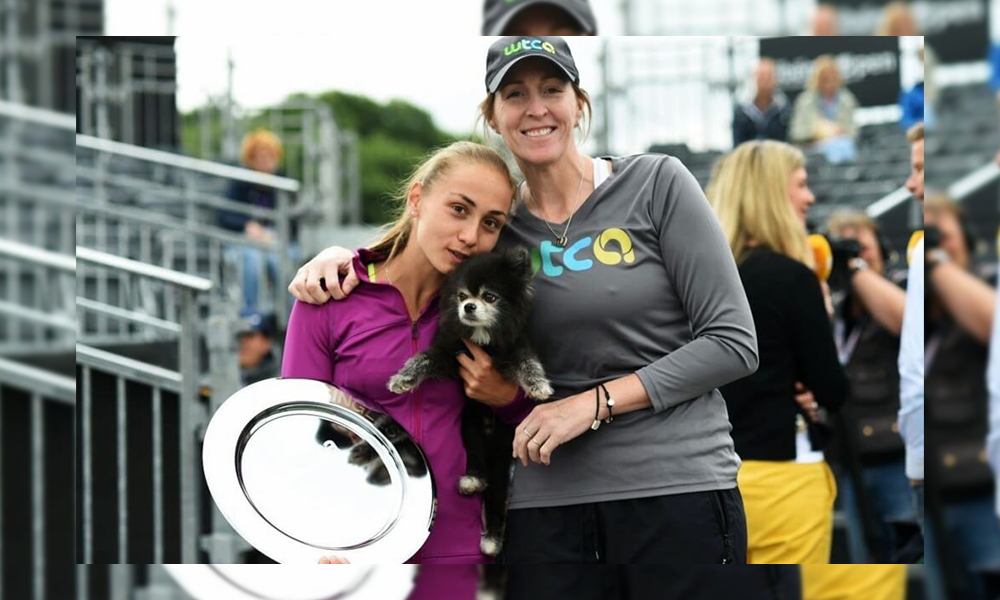
SportsEdTV: You've gone full gambit from growing up in Australia from junior tennis player to professional player and your dad was a coach hanging around top players like Peter McNamara. Tell us a little bit about your life in Australia and what was junior tennis like at home and with your dad being a coach?
Sarah: My dad being a coach was extremely difficult. I thought it was it's very tough and if I could go back, I would never have had my dad as my main coach. His opinion, Sure. He's a very good coach, having his opinion in the conversation is always valuable, but it's extremely difficult because as a kid just can't go home. It's always tennis and that's all we ever talked about.
My dad is a kind of coach for me that was sort of like proved me wrong. I would be on the opposite side. I'm like, well, if that's how you want to be, I'm not going to do it. I don't respond very well to someone pushing me down to think I'm going to prove them wrong. It's just not my way and I don't coach like that.
SportsEdTV: It makes an interesting point just right off the bat. What you're saying is when your dad is the coach, your dad really needs to be the dad?
Sarah: Yes.
SportsEdTV: He's there for you and he needs to be the support system.
Sarah: Correct.
SportsEdTV: I think especially not that I like to differentiate, but I do feel like on the women's side, that's even more important in the early ages, I feel like that is a key factor, that a dad is going to be very supportive and be very careful how he puts information out there, especially for someone like you that actually cares. You had two junior girls in Australia, but there must be a lot of fun playing junior tennis in Australia, right?
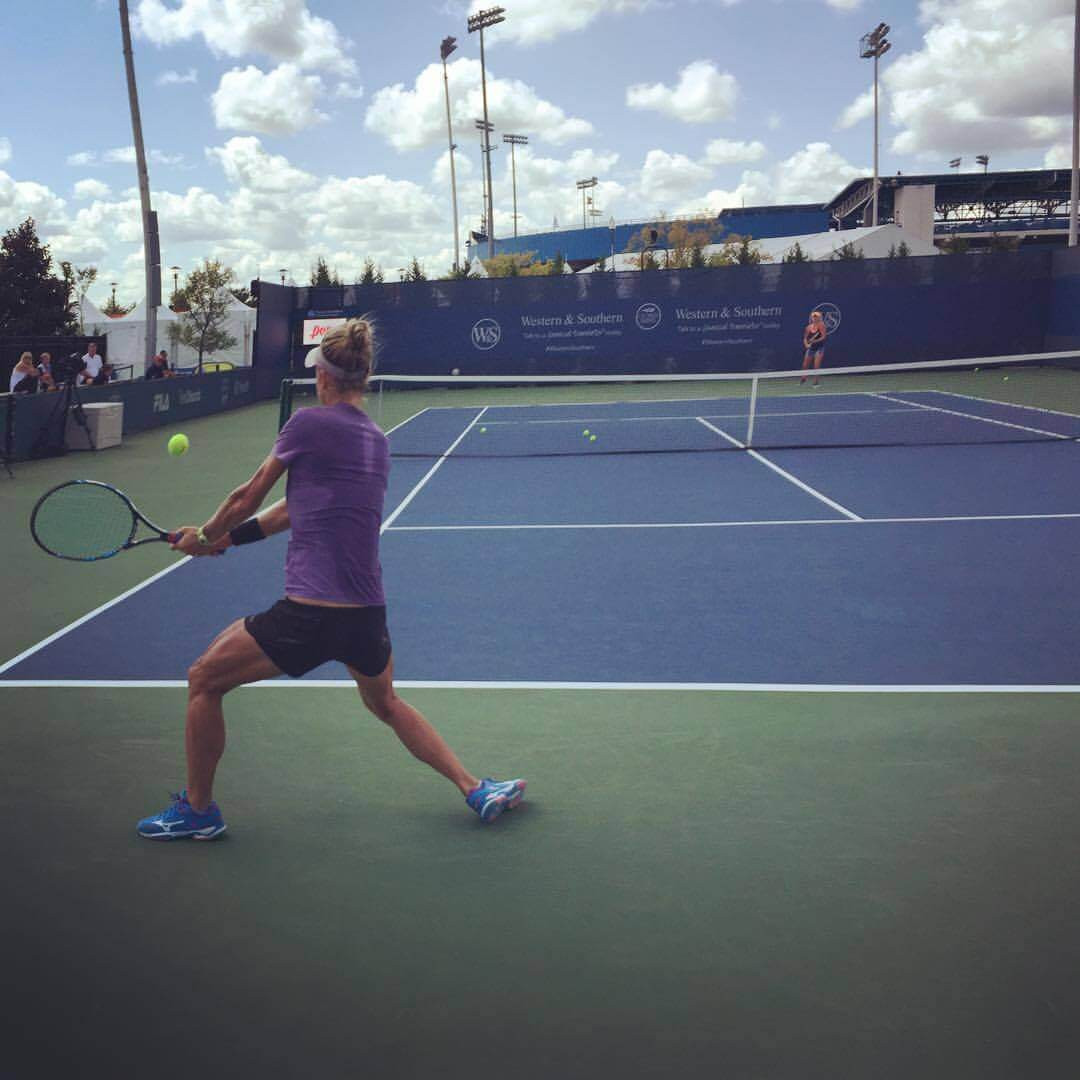 Sarah: Yeah, it was great. I'm still very close to all of my friends. We are pretty much a crew to this day and when I look at some of the changes that they've made for Tennis Australia, the way junior tennis is done, it's really sad for me because we used to look forward to playing for our state team. You get on the state team and you play like a national Carnival against each other at the end of the year. We also had another event which was named the Coach Masters, and it would be the top eight players in the age group would play off at a tournament at the end of the year. I think it was 14, 16 and 18. All those players would get together in Australia and they do something a little bit like that but it really lost that.
Sarah: Yeah, it was great. I'm still very close to all of my friends. We are pretty much a crew to this day and when I look at some of the changes that they've made for Tennis Australia, the way junior tennis is done, it's really sad for me because we used to look forward to playing for our state team. You get on the state team and you play like a national Carnival against each other at the end of the year. We also had another event which was named the Coach Masters, and it would be the top eight players in the age group would play off at a tournament at the end of the year. I think it was 14, 16 and 18. All those players would get together in Australia and they do something a little bit like that but it really lost that.
We've gone away from a national tournament that we used to play because they've tried to move everything to be around the Australian Open like this showdown and I understand that but we still love it where we were going. It was great. I grew up with some really good players. Alicia Molik went on to be a great player and the same stars as two years younger than me. But how it kind of worked was, I pretty much knew the players a couple of years younger and couple of years older, and we're all still friends. That the thing in Australia, it's such a great experience growing up with your friends and if you take away that fun of growing relationships from a kid, when you get to my age, I'm thirty-eight and then you don't have anything that you feel like you belong to from what you grew up with. I think the federations are overlooking the experience factor of just being a junior growing up and playing tennis.
SportsEdTV: Yeah, and I grew up with that too in South Africa where we were a very tight in this group and everything was very different and now obviously the world has changed. Junior tennis has definitely changed a lot more of a business than the world of academies, that changed a lot of things. Now you go from a junior player and you start playing on the WTA tour, what was your first year like turning pro? What did that feel like for you?
Sarah: I started playing a couple twenty five K challenges, probably from when I was 13. I first played one and at that time you could play them at 13. I just went along because it was just a tournament my dad took me. I went around, left. I didn't even know you got prize money, so they sent me a prize money in the mail. Then, basically what it looked like for us as kids as we were playing a junior tournament and the junior slams and things like that, and we would play the circuits that were in Australia. We were kind of playing professionally from a young age, but we weren't, it wasn't a full-time thing. In the beginning, it was no different than me playing a junior tournament because all my friends did it. We just went along and we lost more than we were used to, obviously, in juniors and then right after, when I was 17, after junior Wimbledon, I came home and I didn't want to play anymore at all, so I stopped playing for two years. I wanted to be a chef and I did some stuff doing that and then one of my friends called me up and said, we need a player in Europe for this professional league and I played for two years, so I don't think I'm your person. They said, no, no, no, you'll be fine and I went over to practice a little bit. I won every match, it went well and a couple of friends will go to some pro tournament and I was in Europe and I thought, oh, that would be fun, be a bit of a tourist. I went in and had a little success, had a bit of fun, came back to Australia and was due to go to Japan for a first satellite tour. The day before I was like, no, I don't want to go. I'm not really into it. I don't want to play and my friend said, I need you to come because we're going together. I went, I did OK. I did alright, in doubles, I made the final of four of the tournaments, so that was ticking along. Do you really like playing singles ever in my life? Because it was boring to me and I came home and I just kind of went from there. Not too long after that, I started playing doubles with Samantha Stosur and that was fun. We had a lot of success and got to play the Australian Open together.
After about a year and a half of that, I got injured and I couldn't play because my foot, I didn't care enough. I knew that I just didn't want to play that much. I wasn't that invested, so I stopped. That was the process.
SportsEdTV: You played the Australian Open.
Sarah: Yes and then I played doubles at Wimbledon and that was fun.
SportsEdTV: Instead of seeing it like that in your country, because, Australia is a very tight-knit sports country. It must have been a good feeling when you got there and played those matches.
Sarah: It was it was good, it was. Sam was doing really well in singles and I had a chat with Paul McNamee and they gave us a wild card and it was fun. I remember I was underneath there and he goes, you know, the reason you guys got the Wild card was because of you. It wasn't because of Sam and I just had a laugh and is he's a mate of my dad's and I was like, yeah, right. Anyway, we went out there and that actually was a tough day. It was a lot, a lot was going on that day, but I do remember how it was nice that all my friends and my family if I could go back, I would have liked to absorb more of it. I was young, I was twenty-one, and I didn't feel the prestige of playing it and very much honestly the same thing when I played at Wimbledon.
The same thing, a friend of mine. I wasn't going to play and she couldn't get into the qualifying, but I was ranked higher than her and her partner. She said I need you to get me in. I said, sure, we'll play and we beat Cameron and Dinara Safina, who was ranked 30 in the world in singles at the time. We beat them qualies and then we got into the main draw and it was cool but I wasn't ever really chuffed with wanting to be a tennis player. Looking back in my career, was it was a very important experience to be able to share with kids and stuff like that. But I think coaches overlooked that. I never really wanted to be a pro.
SportsEdTV: When I listen to what you just told me and you're going through that experience, but that gives you the background and you get the understanding, you're one of the world's top coaches. Ten years on the WTA tour what you just discussed. I know made you one of the world's best coaches. Tell me now you go from a player to a coach. What was that decision based on and how did you feel at that moment?
Sarah: I started coaching for my dad when I was 14, doing some groups, a couple privates and I am around a tennis family, for me, going into coaching was just like anything. It was quite straightforward because I was learning about it, even though I didn't even know. When I got injured and Sam didn't have a coach obviously we got along well. I did know quite a bit about her game because I've been around. It just kind of went like that and I was lucky that even though my dad was very hard for me, I was lucky that he was part of my tennis journey, because when I thought I wasn't listening, subconsciously I absorbed the information, but consciously, I just wasn't able to process it or really enjoy being in that moment. It was pretty easy for me. It doesn't happen to everyone that way. But I had already such a big amount of knowledge drilled into my head that it enabled me at twenty-one to be able to coach at a pretty high level, the highest level.

